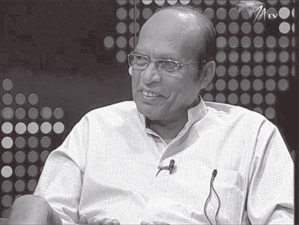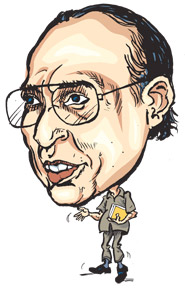|
COPE faults 48 institutions:
'Audit, an integral part of transparency'- DEW
By Manjula FERNANDO
 Senior Minister of Human Resources and Chairman of the Committee on
Public Enterprises (COPE) DEW Gunasekera joined in an interview with the
Sunday Observer in the Parliament, shortly after presenting their latest
report on the performance and financial accountability of the State
institutions. Senior Minister of Human Resources and Chairman of the Committee on
Public Enterprises (COPE) DEW Gunasekera joined in an interview with the
Sunday Observer in the Parliament, shortly after presenting their latest
report on the performance and financial accountability of the State
institutions.
In the interview he emphasised the need to strengthen the Department
of Auditor General and spoke of the challenges facing the public sector
of the country.
Q: You have classified in the COPE report some 40 state
companies, out of 229 that were under the committee's microscope, as
loss incurring enterprises. What has led to this situation?
A: Among the reasons identified, the failure by the Ministry
Secretary to perform as the chief accounting officer responsible for all
financial transactions was seen as a crucial factor. The Secretaries
have faltered from this most important role.
Q: Do you think the people have faith that this report will
contribute to eliminate corruption in the state sector ?
A: I do not know yet, but that is our intention . That is why
we want to implement the report and that is why we are discussing a
mechanism to implement the recommendations. I have summoned all the
permanent secretaries for a conference here in parliament. President's
Secretary and Treasury Secretary have also been invited.
Q: What is the message the President has given the COPE
committee?
A: In his budget speech President Rajapaksa said that he fully
appreciates the work by the COPE. This is a positive signal that the
report is going to be well received and given serious thought.
We have received a good response from all the institutions and the
Ministry Secretaries under whose purview these institutions function.
Judging by that, I am quite confident that we can make a difference. The
public servants did not regard the committee's work as offensive action,
but instead they have been very cooperative.
Q: Do you think the 40 odd faltering institutions can be
salvaged?
 A: Yes I think we can. Not all the companies are incurring
losses. Some of them have been losing their profits at an alarming rate.
Some even by 90 per cent. We have pointed them out, so that corrective
action can be taken immediately. A: Yes I think we can. Not all the companies are incurring
losses. Some of them have been losing their profits at an alarming rate.
Some even by 90 per cent. We have pointed them out, so that corrective
action can be taken immediately.
There are a number of stakeholders, the Government, the management
and the line Ministries, we all must get together.
Then we can do it. We are cautioning with regard to the appointment
of Chairmen and Board of directors.
The people chosen should be professionally qualified. I don't want to
mention names. For instance there is a state insurance company, among
the institutions that we scrutinised, where not a single board of
director is qualified in insurance.
There was a recently set up bank, where no board member was qualified
in Banking. No wonder these companies were running at a loss or heading
towards bankruptcy.
This particular Bank has given so much of loans but not a single cent
was recovered. We have personally informed this to the President. We are
not blaming just one person for the faults that we have unearthed. The
responsibility has to be shared down the line from the top most position
of the Government.
Q: An equal number of members from the Government and the
opposition were seated in the COPE committee. Was there any dissent at
any time?
A: No dissent at any stage. We sat at the meetings as
independent judges in a court room. This culture of working together in
issues of national interest was there from the beginning. The
politicisation of committees began with the politics of the open
economy. But I was able to bring all of them together and win the
confidence of the opposition members.
A: We made Karu Jayasuriya as one of the chairmen of the three
subcommittees.
That step made a collateral change. We worked as a team. He was the
Chairman of sub committee II, the other Chairmen of sub committees were
Minister Susil Premajayantha and Deputy Minister Lasantha Alagiyawanna
Q: How did you extract information on internal dealings, the
hidden data?
A: We summoned officials of the individual institutions and
made inquiries, their statements had to be supported by documents. In
fact some of the officials who were helpless to take action against
their superiors were happy the COPE was doing their work for them.
The corrupt Bosses stopped misappropriation of funds and vehicles
fearing COPE exposure.
The committee members later discussed these minutes, what transpired
at the question and answer sessions and came out with the
recommendations that has been compiled in the COPE report that we tabled
today (Dec 1).
Q: Given the past experience with the COPE reports, the
corrupt officials may think that they need not fear your committee
because the report will never be taken seriously?
A: We have already seen results. Our initial work brought back
a vehicle that was lost from a state institution for over eight years.
This is just one incident. When an official concerned informed the
committee, upon questioning that he did not know where the missing
vehicle was, I insisted him to lodge a police complaint then itself, on
his way back to office.
The vehicle was returned within 48 hours. It was found non other than
a Minister was responsible for the misappropriation of that vehicle. We
took action and the results were immediate. We are after another similar
case where an ex-minister is involved.
He has also taken home a vehicle in this manner. I am certain we
could get the vehicle returned soon. But results with regard to finances
and such dealings need collaborative action and take longer to correct.
Q: Now the report has been presented in parliament. What is
the next step?
A: Our part of the job has come to a conclusion now. Now it is
up to the administration to act on the recommendations. But I want to
facilitate the next step. This is why I have summoned a meeting of the
Ministry Secretaries including the President's Secretary and the
Treasury Secretary in January next year in parliament.
All the 229 institutions that we scrutinised are under the
Ministries.
At the meeting we will revisit the responsibilities of the Ministry
Secretary. There we will convey them how important it is to implement
the recommendations in the report.
One of our key recommendations is for the Ministry Secretary, as the
Chief Accounting Officer to study the report in depth. Necessary
corrective action will also be discussed there.
The President will also see the report and he will think twice before
appointing persons with flawed records as chairmen, board members or
otherwise to state institutions in future.
Q: Did you go into the ways how these incompetent persons
gained entry to reputed organisations resulting in their downfall?
A: That was not our mandate. But the appointing procedure of
officials to state institutions is quite well known.
Q: Your wish is that these recommendations will create a
precedent and be a model for future appointments?
A: That is what we are aiming at. We hope that it will be so.
I made a special statement in parliament after the report was tabled.
Then we issued the copies of the report to the media in a special
media briefing. We want to create public opinion. We don't want to hide
the findings and see it end up in the dust bin.
Q: What are the biggest institutions that received flak by the
COPE?
A: CEB, Ceylon Petroleum Corporation, National Transport
Board, etc. But some of these institutions cannot be blamed for the
losses incurred. The Government subsidises electricity, the prices of
oil as a consumer protection mechanism. Thus the treasury has to go on
subsidising. If they allow the market forces to play the role without
intervention by the Government with regard to policy or the price, then
of course their profits will rise.
Q: What recommendations do the COPE have with regard to such
enterprises to make them profitable?
A: That of course the Government has to decide, people have to
be looked after but at the same time the companies should be assisted to
make profit.
They should not be allowed to be white-elephants or a burden on the
country's economy. The COPE looked into the economy, efficiency,
effectiveness and productivity of these companies.
The COPE is not a stakeholder responsible for the operations of these
institutions. The President, particular Ministries, the board of
directors must decide as to how they can overcome these challenges.
All the 229 institutions that we scrutinised were not profit making
companies, for instance the official languages commission is not a
commercial company. We scrutinised their performance. With regard to
commercially viable enterprises the treasury cannot continue to
subsidise, they have to be allowed to run profitably.
COPE mandate is to look into their accounts and the performance. The
performance as to whether the institutions were serving the people as
per their obligations, thereby to strengthen the countability and the
transparency of these institutions.
Q: At the end of the 16 months of heavy work looking into the
irregularities in 229 state institutions, how do you feel about the
outcome?
A: First of all we were able to complete the whole assignment
before the deadline - the budget debate. Secondly we have produced a
report with very good recommendations plus a set of general
recommendations to be noted by the President, the Ministers and
Secretaries, etc. We have proposed to streamline tender procedures.
The past 16 months of work by the COPE has made a significant impact
on the institutions concerned. We did not function as 'rude
administrators', instead we build up a good rapport that yielded
results.
Our role has made a very positive impact on their functions and I am
satisfied with what we have achieved. Now it is up to the officers
concerned to act on these recommendations.
|

